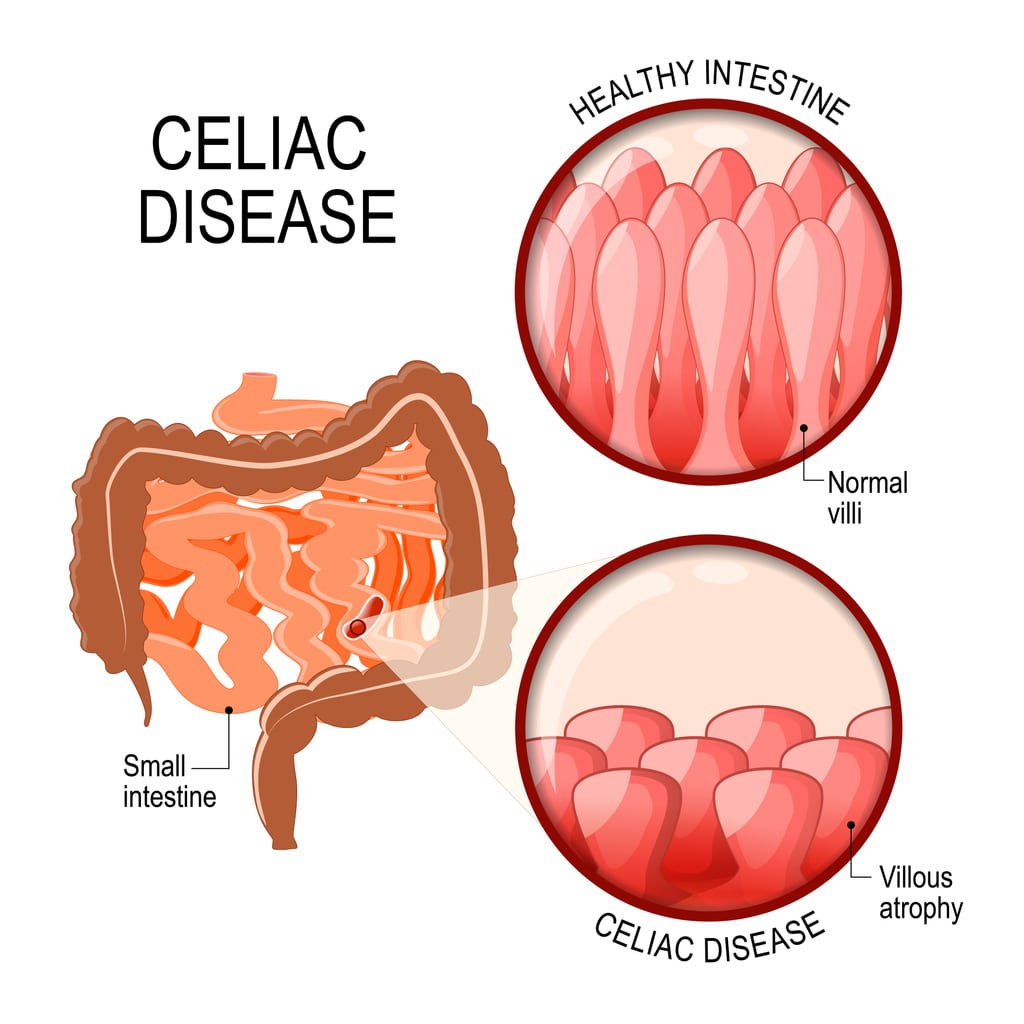
How Celiac Disease Affects the Body Beyond the Gut
Celiac disease is linked to digestive issues, but it affects more than the gut. This autoimmune condition can affect multiple systems in the body, leading to various symptoms. Understanding these broader effects is necessary for recognizing the full scope of celiac disease and its potential complications.
Understanding Celiac Disease
Celiac disease is an autoimmune condition resulting from a faulty immune response to gluten, a protein in wheat, barley, and rye. Gluten harms people with this condition, triggering their immune system to attack the small intestine, causing inflammation and damage. Over time, this damage can cause symptoms ranging from gastrointestinal issues to complications in other body parts.

Symptoms of Celiac Disease
Celiac disease can cause a wide range of symptoms that affect both the digestive system and other parts of the body. Here are some of the most common signs to look out for:
- Chronic Diarrhea or Constipation: Persistent changes in bowel habits, such as frequent loose stools or difficulty passing stools. If left untreated, these symptoms may lead to dehydration, discomfort, and nutritional deficiencies.
- Abdominal Pain and Bloating: Sharp or persistent discomfort in the stomach area, often accompanied by noticeable swelling or pressure. These symptoms can make eating meals uncomfortable and may worsen after consuming gluten.
- Fatigue: A constant feeling of exhaustion or lack of energy, even after a full night’s sleep. Fatigue can stem from the malabsorption of vital nutrients like iron and vitamin B12. These are critical for producing energy.
- Unexplained Weight Loss: Losing weight unintentionally, even when maintaining regular eating habits. This can result from the body’s inability to properly absorb nutrients due to intestinal damage.
- Skin Rashes: An intensely itchy, blistering rash called dermatitis herpetiformis. It typically appears on the elbows, knees, scalp, or back. This skin rash is a hallmark symptom of celiac disease in some individuals and may persist until gluten is eliminated from the diet.
The Role of the Gut Microbiome
Your gut microbiome plays a key role in your overall health. It’s made up of trillions of bacteria, viruses, and fungi that work together to support digestion, immunity, and even your mood. In people with celiac disease, gluten can trigger inflammation in the small intestine, which disrupts the balance of the microbiome. This can make symptoms worse and even lead to problems outside the digestive system. A healthy, balanced microbiome is essential for absorbing nutrients. When it’s out of balance, the body struggles to process important vitamins and minerals.
Dysbiosis and Its Implications
Dysbiosis refers to an imbalance in the gut’s bacteria, which can worsen celiac disease symptoms and impact overall health. Several factors can cause dysbiosis in those with celiac disease:
- Diet Changes: A gluten-free diet can reduce gut bacteria diversity, potentially leading to inflammation and digestive issues.
- Infections: Gastrointestinal infections can disrupt the microbiome, making symptoms worse.
- Antibiotic Use: Overuse of antibiotics can harm the gut and disrupt immune function.
- Immune System Response: The immune attack on the small intestine from gluten exposure can also disrupt gut bacteria, intensifying symptoms.
- Leaky Gut: Dysbiosis can damage the intestinal lining, allowing harmful substances to enter the bloodstream and trigger immune reactions.
The disruptions caused by dysbiosis are just one part of how celiac disease affects the body. While the gut microbiome plays a critical role in digestion and immune function, the effects of celiac disease extend far beyond the digestive system. As the body’s immune response continues to attack the small intestine, it can also trigger a cascade of complications in other areas of health, from the nervous system to reproductive and heart health.

The Full Impact of Celiac Disease
Celiac disease affects more than just the digestive system. It can impact health in many areas, including:
Neurological and Psychological Symptoms
Celiac disease can affect the nervous system. It can cause headaches, brain fog, and nerve issues like tingling in the hands and feet. Psychological symptoms like anxiety and depression, are common. They may worsen the disease’s impact.
Bone and Joint Health
Celiac disease can weaken bones by causing nutrient malabsorption. This raises the risk of fractures and osteoporosis. Joint pain and inflammation are also common, affecting mobility and overall well-being.
Reproductive Health
Celiac disease can harm reproductive health. It can cause fertility issues and pregnancy complications, like miscarriage or low birth weight. These are often due to nutrient deficiencies.
Heart Health
Celiac disease has been linked to an increased risk of cardiovascular issues. An autoimmune response can cause inflammation. This raises the risk of heart disease, including blood vessel problems. This is due to a lack of essential nutrients, like folate and iron.
Increased Risk of Other Autoimmune Conditions
Celiac disease raises the risk of other autoimmune conditions. These include type 1 diabetes, thyroid disorders, and autoimmune liver diseases. This is due to an overactive immune system.
Preventative Measures
To manage celiac disease and its health effects, you should consider these strategies:
- Follow a Strict Gluten-Free Diet: This is the best way to manage symptoms and prevent further damage to the small intestine.
- Take Nutritional Supplements: Fill nutrient gaps like iron, calcium, vitamin D, and vitamin B12. This helps support your health and prevents issues like anemia and weak bones.
- Schedule Regular Medical Check-Ups: Regular visits for blood tests, bone scans, and neurological tests ensure early detection of complications.
- Support Gut Health with Probiotics: Probiotics can restore gut balance and improve digestion.
- Find Support Groups: Support groups and online communities can help people with celiac disease. They can share experiences, gain support, and learn from others facing similar challenges.

Contact Us for Care
At GastroMD, we understand that celiac disease goes beyond just digestive issues—it impacts various aspects of your overall health. From fatigue and skin rashes to complications with bone health and mood, celiac disease can affect multiple systems in the body. That’s why we’re here to provide expert guidance and personalized care tailored to your unique needs. Our team of specialists is dedicated to helping you manage your condition and improve your quality of life. Whether you need support with a gluten-free diet, nutritional counseling, or managing the broader effects of celiac disease, we are ready to assist you every step of the way. Reach out to GastroMD today to learn more about how we can help you take control of your health and live a fuller, healthier life.



